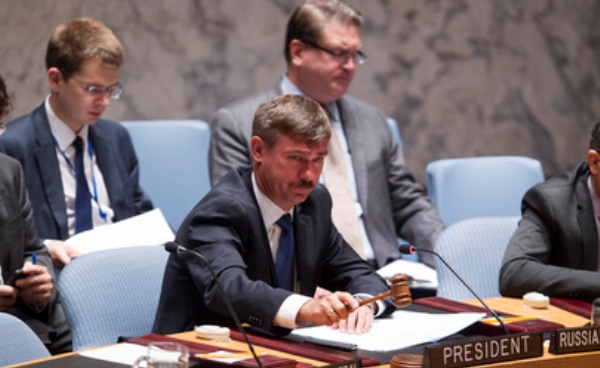South Sudan lauds Russia objection to arms embargo

November 18, 2016 (JUBA)- South Sudanese officials on Friday lauded the rejection by the veto -power Russian government of an American proposal by to United Nations Security Council to impose arms embargo and targeted sanctions on the new nation.
U.S. Ambassador to the United Nations, Samantha Power, called for the imposition of an arm embargo on South Sudan, pointing that all the ingredients for a genocide exist in South Sudan.
She admitted that no embargo can completely stop weapons getting into the country, adding that “an arms embargo could have a significant impact on the ground”.
However, South Sudanese cabinet Affairs and defence ministers described the proposal to impose sanctions as part of the efforts aimed frustrating implementation of the peace agreement and prolongs the suffering of the people.
“The government and the people of South Sudan have said time and again that there is no need to impose sanctions. The peace agreement has been signed and it is being implemented fully,” said cabinet affairs minister Martin Elia Lomuro in statements to Sudan Tribune.
“What is needed now from the international community is to stand with the transitional government of national unity in the implementation of the peace agreement. The parties to the agreement are already working together. They don’t need sanctions. So what is the use of these proposals again,” he added on Friday.
Meanwhile Defence Minister Kuol Manyang Juuk told Sudan Tribune in a separate interview that sanctions would undermine the implementation of the agreement and will perpetuate the suffering of the people. He described the proposal as an “obstruction” of ongoing efforts to resolve the conflict peacefully, stressing that the only way to end the suffering of the people is a political solution.
“When you impose arms embargo on a sovereign state, what does that mean? It means you want no solution to the conflict and it does not represent any attempts to resolve the conflict you want to stop peacefully. And the solution itself becomes a problem. So ,we say sanctions are not the solution,” said Juuk.
The proposal to impose arms embargo and targeted sanctions on South Sudan was supported by two permanent members in the Security Council: UK and France who have power of veto.
The move came after Adama Dieng, the Advisor on Preventing Genocide tabled a report that there is a high risk of genocide in South Sudan, after targeted ethnic killings of civilians. Ellen Løj said that the UNSC has to place the children and the women of South Sudan first in their decisions.
The Russian Deputy Ambassador Petr Iliichev voiced his objection to the imposition of an arm embargo, pointing that the proposed sanction would complicate relations between the host country, the peacekeeping mission there and the international community.
“introducing targeted sanctions against South Sudanese leaders would be the height of irresponsibility now,” Iliiche further said, stressing that some members of the UNSC want President Kiir to share the fate of the former Libyan leader Muammar Gaddafi.
Angola, another of South Sudan’s allies albeit without veto power, also objected the U.S. proposal saying arms embargo is not a solution.
Also, its ambassador regretted the report of the UN panel of experts. “The Angolans objected to unhelpful language used in the report to de-legitimatize the Transitional Government of National Unity”.
The Chinese also expressed reservation and seemed indecisive. The Chinese Deputy Ambassador Wo Haito said the Council should be “prudent” and avoid imposing sanctions in order “to avoid complicating the situation.”
South Sudanese officials say the “whole farce” is a ploy for regime change.
South Sudan representative told the Security Council that no sovereign country can accept an armed rebellion. He said the only way to prevent genocide is to end the rebellion not impose arms embargo or sanctions.
(ST)
